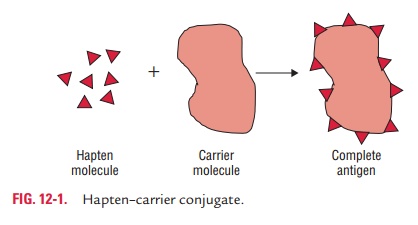Chapter: Microbiology and Immunology: Antigen
Haptens
Haptens
Haptens are small organic molecules that are antigenic but not
immunogenic. They are not immunogenic because they can-not activate helper T
cells. Failure of hapten to activate helper T cells is due to their inability
to bind to MHC proteins; they cannot bind because they are not proteins and
only proteins can be presented by MHC proteins. Moreover, haptens are univalent
hence cannot activate B cells by themselves.
The haptens, however, can activate B cells when covalently bound to
a “carrier” protein. When bound with a carrier mol-ecule, they form an
immunogenic hapten–carrier conjugate (Fig. 12-1). In this process, the haptens
combine with an IgM receptor on the B cells, and the hapten–carrier protein
complex is internalized. A peptide of the carrier protein is presented in
association with class II MHC protein to the helper T cells. The activated
helper T cells then produce interleukins, which stimulate the B cells to
produce antibodies to hapten.

Animals immunized with such a conjugate produce anti-bodies specific for (a) the hapten determinant, (b) unaltered epitopes on the carrier protein, and (c) new epitopes formed by combined parts of both the hapten and carrier. In fact, the hap-ten–carrier molecule is bound to surface immunoglobulins on B cells via the hapten epitopes. The hapten–carrier molecule is then taken in, processed, and pieces of the carrier are presented by these B cells and TH cells. In the body, the formation of hap-ten–carrier conjugates is the basis for development of allergic responses to drugs, such as penicillin.
Related Topics